英语知识点:短语、词组
英语第十四单元知识点

英语第十四单元知识点英语第十四单元知识点:本文将介绍英语第十四单元的重点知识,内容涵盖语法、词汇和阅读理解等方面。
希望通过本文的阐述,能够帮助读者更好地掌握这些知识点,提高英语水平。
一、语法知识点1. 直接引语和间接引语:直接引语是原样引用别人的话,需要使用引号;间接引语是对别人说的话进行转述,不使用引号,且需要根据句子结构和时态等进行相应的转变。
2. 动词时态和语态:英语中有多种动词时态和语态的形式,需要根据上下文和句意来选择适当的时态和语态。
3. 条件句:条件句用于表达假设、推理或虚拟情况,主要分为三种类型:零条件句、一般条件句和虚拟条件句。
每种类型都有各自的语法结构和用法。
4. 定语从句:定语从句用于修饰某个名词或代词,一般由关系代词或关系副词引导,并且在从句中充当句子的一部分。
5. 状语从句:状语从句用于表示时间、条件、原因、结果等,一般由连词引导,并且在从句中充当状语的作用。
二、词汇知识点1. 同义词和反义词:同义词是指意义相近或相同的词语,可以用来增加语言表达的多样性;反义词是指意义相反的词语,可以用来进行对比和强调。
2. 词性转换:有些词语可以通过改变词缀或词性进行转换,从而表达不同的含义或用法。
比如,名词可以转换为动词或形容词,动词可以转换为名词等。
3. 词组和短语:词组是由两个或多个单词组成的固定搭配,具有固定的意义和用法;短语是由几个单词组成的固定组合,但其意义可根据上下文进行调整。
三、阅读理解知识点1. 主旨概括:阅读理解中要求读者从段落或全文中找出主旨或概括文章的中心思想,并进行准确的归纳总结。
2. 推理判断:阅读理解中会涉及到作者的暗示和信息的推理,要求读者根据细节、上下文等进行推理和判断,得出正确的答案。
3. 细节理解:阅读理解中会涉及到一些具体的细节信息,要求读者通过仔细阅读文字,找出相关的细节来回答问题。
4. 文章结构:阅读理解中的文章往往有一定的结构和组织,读者需要通过观察段落的开头和结尾,以及段落之间的逻辑关系来理解文章的结构。
总结五种短语类型的知识点
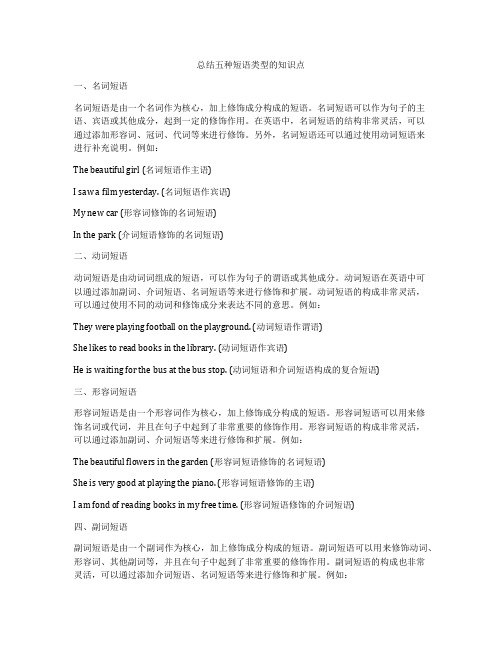
总结五种短语类型的知识点一、名词短语名词短语是由一个名词作为核心,加上修饰成分构成的短语。
名词短语可以作为句子的主语、宾语或其他成分,起到一定的修饰作用。
在英语中,名词短语的结构非常灵活,可以通过添加形容词、冠词、代词等来进行修饰。
另外,名词短语还可以通过使用动词短语来进行补充说明。
例如:The beautiful girl (名词短语作主语)I saw a film yesterday. (名词短语作宾语)My new car (形容词修饰的名词短语)In the park (介词短语修饰的名词短语)二、动词短语动词短语是由动词词组成的短语,可以作为句子的谓语或其他成分。
动词短语在英语中可以通过添加副词、介词短语、名词短语等来进行修饰和扩展。
动词短语的构成非常灵活,可以通过使用不同的动词和修饰成分来表达不同的意思。
例如:They were playing football on the playground. (动词短语作谓语)She likes to read books in the library. (动词短语作宾语)He is waiting for the bus at the bus stop. (动词短语和介词短语构成的复合短语)三、形容词短语形容词短语是由一个形容词作为核心,加上修饰成分构成的短语。
形容词短语可以用来修饰名词或代词,并且在句子中起到了非常重要的修饰作用。
形容词短语的构成非常灵活,可以通过添加副词、介词短语等来进行修饰和扩展。
例如:The beautiful flowers in the garden (形容词短语修饰的名词短语)She is very good at playing the piano. (形容词短语修饰的主语)I am fond of reading books in my free time. (形容词短语修饰的介词短语)四、副词短语副词短语是由一个副词作为核心,加上修饰成分构成的短语。
八年级英语上册第一单元语法知识点归纳
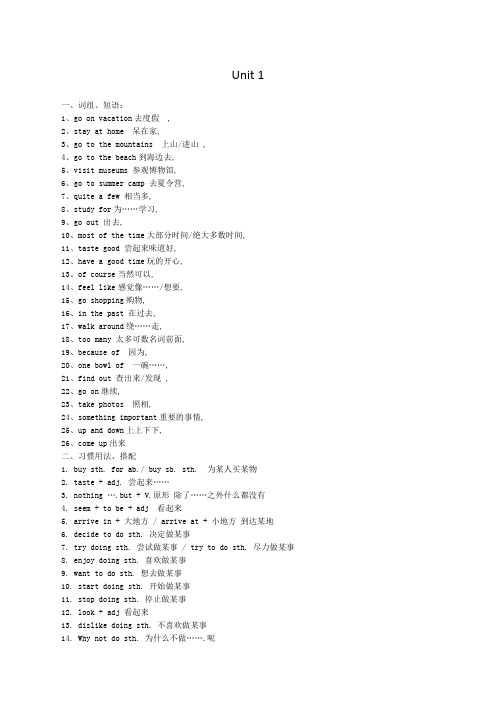
Unit 1一、词组、短语:1、go on vacation去度假 ,2、stay at home 呆在家,3、go to the mountains 上山/进山 ,4、go to the beach到海边去,5、visit museums 参观博物馆,6、go to summer camp 去夏令营,7、quite a few 相当多,8、study for为……学习,9、go out 出去,10、most of the time大部分时间/绝大多数时间,11、taste good 尝起来味道好,12、have a good time玩的开心,13、of course当然可以,14、feel like感觉像……/想要,15、go shopping购物,16、in the past 在过去,17、walk around绕……走,18、too many 太多可数名词前面,19、because of 因为,20、one bowl of 一碗……,21、find out 查出来/发现 ,22、go on继续,23、take photos 照相,24、something important重要的事情,25、up and down上上下下,26、come up出来二、习惯用法、搭配1. buy sth. for ab./ buy sb. sth. 为某人买某物2. taste + adj. 尝起来……3. nothing ….but + V.原形除了……之外什么都没有4. seem + to be + adj 看起来5. arrive in + 大地方 / arrive at + 小地方到达某地6. decide to do sth. 决定做某事7. try doing sth. 尝试做某事 / try to do sth. 尽力做某事8. enjoy doing sth. 喜欢做某事9. want to do sth. 想去做某事10. start doing sth. 开始做某事11. stop doing sth. 停止做某事12. look + adj 看起来13. dislike doing sth. 不喜欢做某事14. Why not do sth. 为什么不做…….呢15. so + adj + that + 从句如此……以至于……16. tell sb. not to do sth. 告诉某人不要做某事17. keep doing sth. 继续做某事18. forget to do sth. 忘记去做某事 / forget doing sth 忘记做过某事三、重点句子1. Where did you go on vacation 你去哪儿度假的1这是一个由疑问副词where引导的特殊疑问句;Where用来询问地点或场所,用于句首,其后跟一般疑问句;如:Where are you from Where does he live2go on vacation“去度假”He will go on vacation with his family. 他要和家人一起度假;解析 vacation v'ken n 假期 = holidayon vacation 在度假 take a vacation 去度假 winter vacation 寒假 summer vacation 暑假①I have a lot of _______________every year . vacation②— Where did Sarah go on vacation— She went to America.A.on vacationB. take a vacationC. is on vacationD. is for vacation2、Did you go with anyone你和别人一起去的吗这是一个一般过去时的一般疑问句;当含有实义动词的一般过去时的陈述句变为一般疑问句时,需借助助动词did,此时后面的实义动词应用原形;其句型结构为“did+主语+动词原形+其它”,肯定回答为“Yes,主语+did”,否定回答为“No,主语+didn′t”·基本用法pron. anyone 任何人,相当于anybody,通常用在否定句、疑问句或条件从句中;如: I wont tell anyone I saw you here. 我不会告诉任何人我在这儿见过你;Why would anyone want that job 为什么会有人想要那份工作呢知识拓展---同类词Some - any- no- every-指人 someone 有人 anyone 任何人 anybody no one 没有人nobody everyone 人人 everybody指物 something 某物 anything 任何事 nothing 没有事everything 一切事指地点 somewhere 某地 anywhere 任何地方 nowhere 无处,没有地方 everywhere 到处注意:1由some-, any-, no-, every-构成的符合不定代词作主语时,都作单数看待,其谓语动词用第三人称单数形式;2不定代词若有定语修饰,该定语要置于其后,作后置定语;如:Id like something to drink. 我想要些喝的;Is there anything interesting in the book 这本书中有有趣的东西吗小结:解析1someone smwn pron 某人anyone eniwn pron 任何人 everyone evriwn pron 每人,人人 my uncle 看望了我的叔叔visit是及物动词,意为“拜访;探望”,后接表示人的名词或代词; visit还可以意为“参观;游览”,后接表示地点的名词;a.I visited my grandmother last week. 上周我去______了我的外婆;b. you want to visit Shanghai 你想______上海吗c.拓展:visitor意为“参观者;游客”;These visitors come fromanything special 买特别的东西;P21buy及物动词,意为“买;购买”;其过去式为______;拓展:buy sth. for sb.=buy sb. sth. 意为“给某人买某物”; My uncle_____ _____a bike.= My uncle_____ _____for me.2)anything不定代词,意为“某事;某件东西”,主要用于疑问句或否定句中;a.Do you want to buy anything for me cant say anything about it.3)anthing special表示“特别的东西”,形容词修饰不定代词时后置;Is there________ ________in this book这本书里有新的内容吗, did you go anywhere interesting哦,你去有趣的地方了吗P21本句是did开头的一般疑问句2anywhere用作副词,意为“在任何地方”;eg:Did you go anywhere during the summer vacation 辨析:anywhere与somewhereanywhere意为“在任何地方”,常用于否定句和疑问句中; eg:I cant find it anywhere.somewhere意为“在某处;到某处”,常用于肯定句中; eg:I lost my key somewhere near here. took quite a few photos there.我们在那里拍了不少照片;P2take photos 意为“照相;拍照”; eg:We______ ______on the Great Wall.我们在长城上照了相;辨析:quite a few与quite a littlequite a few 意为“很多;不少”,修饰可数名词复数;quite a little 意为“很多;不少”,修饰不可数名词;a. He stays here for _____ _____ _____days.is _____ _____ _____water in the bottle瓶子.6. I just stayed at home most of the time to read and relax. 我大部分时间只是待在家里读书休息; P2most of the time意为“大部分时间”,其中most为代词,意为“大部分;大多数”拓展most of…意为“……中的大多数”,它作主语时,谓语动词取决于most of后所修饰的名词;of us_____begoing to the park. 我们大多数人要去公园;b. Most of the food_____gobad. 大部分的食物都变质了;7.Everything tasted really good所有的东西尝起来真的很好吃P3taste在此为系动词,意为“尝起来”,其后接形容词构成系表结构;a.The food tastes really great.食物尝起来棒极了;8. Did everyone have a good time大家都玩得很开心吗P3have a good time = enjoy oneself = have fun 玩得开心 + doingeg: We had a good time visiting the the Great Wall. = We enjoyed ourselves visiting the the Great Wall.= We had fun visiting the the Great Wall.did you like it 你觉得它怎么样P3How do/did you like……意为“你觉得……怎么样”,用来询问对方的观点或看法,相当What do you think of……eg: How do you like your new job = _____ _____ _____ _____ your new jobyou go shopping 你们去购物了吗P3go shopping意为“去购物;去买东西”,同义短语为do some shopping.eg: I usually go shopping on Sundays.我通常星期天去购物;拓展:“go+doing”形式表示“去做某事”,常用于表达从事某一体育活动或休闲活动;go skating 去滑冰go hiking 去远足 go sightseeing 去观光 go fishing 去钓鱼 go swimming 去游泳go boating 去划船went to a friends farm in the countryside with my family.我和家人一起去了乡下一个朋友的农场;P3a friend’s farm是名词所有格形式;一般情况下,表示“有生命的人或物”的名词后面加s,表示所属关系;eg:The red bike is Alices. 那辆红色的自行车是爱丽斯的;拓展:名词所有格的构成:1单数名词词尾加s ,复数名词词尾没有s,也要加sthe girl ‘s pen女孩的钢笔 women’s shoes女鞋 on Children’s Day2复数名词以s结尾的只加the students’ reading room学生阅览室 Teachers’ Day教师节3如果两个名词并列,并且分别有s,则表示“分别有”;只后一个名词有一个s,则表示“共有”:John’s and Kate’s rooms. 约翰和凯特各自的房间; Lily and Lucy’s father. 莉莉和露西的爸爸同一个爸爸; 4表示无生命的名词一般以...of...构成短语,表示所有关系;a map of China一幅中国地图 the name of the story那个故事的名字12.Still no one seemed to be bored. 即使这样仍然没有人看起来无聊;P31seem意为“好像;似乎;看来”;eg:Everything seems easy.一切似乎很容易;拓展 a. seem+adj. “看起来……”; You seem happy today.你今天看起来很高兴;b. seem+to do sth. “似乎,好像做某事”; I seem to have a cold.我似乎感冒了;=It seems that I have a cold.c. It seems/seemed+从句“看起来好像…;似乎…”;It seems that no one believes you.看起来好像没有人相信2辨析:bored与boringa. bored意为“厌烦的;感到无聊的”,一般在句中修饰人;b. boring意为“无聊的;令人厌烦的”,一般在句中修饰事或物;eg:a. I’m ______with what he said.我对他说的话厌烦极了;b. I find the story very_______.我发现这个故事太无聊了;二Section B1. What activities do you find enjoyable 你发现什么活动让人快乐P5enjoyable形容词,意为“愉快的;快乐的”;Im sure we will have an enjoyable vacation. 我确信我们将会有一个愉快的假期;2. I arrived in Penang in Malaysia this morning with my family. 今天早上我和家人到达了马来西亚的槟城;P5arrive不及物动词,意为“到达”;arrive in表示到达较大的地方,如国家、省、市等;arrive at表示到达较小的地方,如机场、商店、广场、村庄等;注:地点副词home,here,there前介词省略辨析:①arrive in+大地点 / arrive at+小地点②get to +地点③reach+地点eg:I 到达 school at 8:00 oclock yesterday.3. …so we decided to go to the beach near our hotel…因此我们决定到旅馆附近的海滩上去;P5 decide to do sth.意为“决定做某事”; eg: They _____ ______ ______the museum.他们决定去参观博物馆;拓展:decide后常跟“疑问词+动词不定式”做宾语;He can’t decide when ______ _____leave 他不能决定何时动身;4. My sister and I tried paragliding.姐姐和我尝试了滑翔伞运动;P5try此处用作及物动词,其后常接名词、动名词或不定式,意为“尝试;试图,设法;努力”She is trying my bicycle.她正在试骑我的自行车;拓展:try也可用作名词,意为“尝试”,常用短语“have a try”,意为“试一试”;I want to have a try.我想试一试;辨析:try doing sth. / try to do sth.1try doing sth. 尝试做某事,表示一种尝试、做做看的想法,不一定付出很多努力;2try to do sth.尽力、设法去做某事,表示想尽一切办法要把事情办成,强调付出努力设法去完成;a. I ______ ______ him, but no one answered. 我试着给他打电话了,但没有人接听;b. Im ______ ______ ______ English well. 我正尽力把英语学好;5. I felt like I was a bird. It was so exciting 我感觉自己就像一只小鸟;太刺激了P51feel like意为“给……的感觉;感受到”;其后常接从句; eg: He feels like he is swimming. 他感觉像在游泳一样;拓展:feel like还可意为“想要……”,其后可接名词、代词或动名词;即: feel like sth. 想要某物 feel like doing sth. 想要做某事 eg:Do you feel like a cup of tea now 你现在想要一杯茶吗Do you feel like ______ take a walk in the park with me 你想跟我在公园散步吗2辨析:exciting与excitedexciting 意为“令人兴奋的,使人激动的”, 一般修饰某物; excited 意为“感到兴奋的,激动的”, 一般修饰某人; Eg: story is_________exciting, excited .told me the_______exciting, excitednews.was_______exciting, excitedto see the singer.6.There are a lot of new buildings now…现在有许多新的建筑物……P5building 可数名词,意为“建筑物;楼房”;build 动词,“建造,建筑” built,built,The workers built many tall buildings in our school last year.7. I wonder what life was like here in the past. 我想知道在这儿过去的生活是什么样的;P5 wonder此处是及物动词,意为“想知道;琢磨”;其后常接who, what, why等疑问词引导的宾语从句;Eg: wonder _______________. 我想知道那个男孩是谁;A. the boy is who B. who the boy is 2. I wonder what they were doing here.我想知道他去哪里了;8.I really enjoyed walking around the town. 我真的很喜欢在镇上到处走走; P51enjoy及物动词,意为“喜爱;欣赏;享受……的乐趣”,其后接名词,代词或动名词作宾语;a. Do you enjoy your job 你喜欢你的工作吗b. I enjoy reading books. 我喜欢读书;enjoy doing sth.喜欢做某事拓展: enjoy oneself =have a good time = have fun 玩得开心 + doing sth.2)walk around 意为“四处走走”;Hes just walking around the village.他只是在村庄里随便走走;9. What a difference a day makes 一天的变化有多大呀 P5difference可数名词,意为“差别,差异”;其形容词形式为different,意为“不同的;有差异的”; Eg: a. What is the difference between this book and that bookb. My schoolbag is different from yours. be different from 意为“与……不同”10.We wanted to walk up to the top , but then it started raining a little so we decided to take the train.P51want to do sth. 意为“想要做某事”;2start doing sth. 意为“开始做某事”,同义短语:start to do sth. Eg: Tom started learning English last year.3a little 意为“一点儿”,在句中修饰动词、形容词或副词;也可以修饰不可数名词;Eg: a. I can draw a little, but only as a hobby. ______________________________b. Its a little cold outside. ______________________________c. He can speak a little English. ______________________________4)take the train意为“乘火车”,take在此意为“乘坐”;waited over an hour for the train because there were too many people. 因为人太多,所以我们等了一个多小时的火车;P51wait for意为“等候”,其后可接人或物; Tom was waiting for a bus over there.2over介词,意为“多于;超过” ,相当于more than; Eg : My father is over 40 years old.Here are over eight hundred students in our school.3 too many意为“太多”,其后接可数名词复数; He always has too many questions to ask me. 辨析:too many + 可数名词复数意为“太多... ”too much + 不可数名词意为“太多... ”much too + 形容词 /副词意为“太... ”eg:I have homework to do today. The weather today is ______ _______ cold. because of the bad weather, we couldnt see anything below.而且因为坏天气,我们也没能看到下面的任何景色P5辨析:because of与becausea. because of意为“因为,由于”,后可接名词短语、代词或动名词,不能接句子; He lost his job because of his age.b. because意为“因为”,引导状语从句,即接句子; I didnt buy the shirt because it was too expensive.13.My father didnt bring enough money…我爸爸没带足够的钱……P51辨析:bring与takebring意为“带来;拿来”, 指从别处带到说话者所在地;take意为“拿走;带走”, 指从说话者所在地带到别处去;2enough 意为“足够的,充分的”1.用来修饰形容词或副词,一般置于被修饰词之后;2.用来修饰名词时放在名词之前;Eg:a. We have enough time to do our homework.b. The box is big enough.14.…because we forgot to bring an umbrella…因为我们忘了带雨伞;P6辨析:forget to do sth.与forget doing sth.forget to do sth. 意为“忘记要做某事事情还没做”eg: Dont forget to close the window. forget doing sth. 意为“忘记做过某事事情已经做过了” eg: I forget closing the window. 15. About one hour later, we stopped and drank some tea. 大约一小时后,我们停下来喝了些茶;P6 1one hour later 一小时后;一小时前__________________2stop动词,意为“停止;中断”,过去式_________,现在分词__________;3drink及物动词,意为“喝;饮”;还可以作名词,意为“饮料”;16. Did you dislike anything 你不喜欢什么东西吗P7dislike意为“不喜欢;厌恶”,其后可接名词、代词或动名词形式作宾语;Eg:a. Mary ______ the hamburgers. 玛丽不喜欢汉堡包;b. I _____ ______ computer 我不喜欢玩电脑游戏;17. Why not 为什么不带呀P8why not意为“为什么不呢”,一般用在疑问句中,表示提建议;why not后面需跟动词原形;注“Why not + 动词原形”相当于“Why dont you+ 动词原形”a. Why not go to the party with me =Why dont you go to the party with me为什么不和我一起去参加聚会呢_____ take a walk = _____ ______ _____ take a walk 为什么不去散步呢in our class took a bag with some food and water. 我们班上的每一个人都随身带了装有食物和水的提袋;P8with介词,意为“具有;带有”; 此处介词短语with some food and water作bag的后置定语;拓展:with作介词时的其他用法:a.“和……一起’ I often go to school ______ my friend. 我经常和朋友们一起去上学;b. 以手段、材料,用工具, Cut the apple with a knife. 用刀切苹果;19. My legs were so tired that I wanted to stop. 我的双腿太累了以至于我都想停下来;P8so…that… / such…that…如此…以致引导的结果状语从句so+adj./adv.+that…Eg:1. He is ____lovely a boy____we love him very much.2.The little boy is so young that he can’t go to school.20. 常用的感叹句的结构:1What +adj.+ 复数名词 / 不可数名词+主语+谓语2What +a/an+adj.+可数名词单数+主语+谓语3How +adj. +a/an+可数名词单数+主语+谓语4How+adj./adv. +主语+谓语eg: an interesting book it is = How interesting a book is 那本书多么有趣啊clever girl she is3. _____clever a girl she isjobs they have donewater it is D. Howthe dog is C. Where D. How21. My classmates told me to keep going, so I went on. 我的同学告诉我坚持往前走,因此我便继续前进了P81tell sb. notto do sth. 意为“告诉某人不要做某事;The teacher ______ ______ ______ ______ the window just now. 老师刚才告诉我们擦窗户;2keep doing sth. 意为“继续做某事,一直做某事”;She______ ______ TV for two hours last night. 昨晚她持续看了两个小时的电视;23.Everyone jumped up and down in excitement. 大家都兴奋地跳起来;P8up and down 意为“上上下下;来来回回”,在句中作状语;Eg:They looked me ______ ______ ______. 他们上上下下打量我;He walks______ ______ ______ in the room. 他在房间里来回走动;22. 反身代词:myself , ourselves, yourself , yourselves, himself, herself, itself, themselves.作动词或介词的宾语:经常在enjoy, teach, hurt, buy, introduce, dress, kill等动词和by, for, to, of等介词后作宾语;一年主考宾语回自身He is teaching himself English.她在自学英语;She was talking to herself.她自言自语;He lives by himself in the country.他独自住在乡下;1)Help yourself 请随便吃吧/请自己去取吧2)2 Make yourself at home 别客气3)make yourself heard /understood. 使你的话被人听得见/理解4)4 teach oneself 自学=learn by oneself5)5 by oneself 独自6)for oneself 为自己;替自己7 enjoy oneself 玩的愉快8 dress oneself 给自己穿衣, little, a few, a little :的用法few, a few修饰可数名词,little, a little修饰不可数名词;few, little具有否定意义,表示“几乎没有”,a few, a little具有肯定意义,表示“一些”;He has little money, but few students want to lend money to him.他几乎没有钱,但是几乎没有学生想借钱给他;There is a little milk and a few apples left in the fridge.冰箱里还有一些牛奶和一些苹果;。
人教版九年级英语重点知识梳理词汇_短语句型语法

九年级英语知识点Unit 1I、重点短语:1.lisen to tapes 听录音2. ask the teacher for help 向老师请求帮助3. read aloud 朗读4. speaking skills 口头表达能力5.spoken English英语口语6. end up 结束ter on 以后,随后8. make mistakes 犯错,出错ugh at嘲笑,取笑10.take notes 做笔记,做记录11.look …up (在词典、参考书等中)查阅,查找12. make up 编造,组成13.deal / do with 处理,应付14.be angry with生……的气15.go by (指时间)过去,消逝16.try one’s best to do sth. 尽力做……17.break off 突然中止,中断18. with the help of 在……的帮助下19.regard…as…把……当做……20.be afraid of doing / to do sth 害怕做某事21. first of all 首先,开始22. have trouble / a difficult / hard time doing sth.做某事有困难II、重点句型:1.It’s too hard to understand the voices. 理解那些话有困难。
(It’s too ...to ....)2. How do you study for a test? I study by listening to tapes.我通过听磁带学习。
(by )3. Studying grammar is a great way to learn a language.(动名词做主语谓语用单数)4.I was afraid to speak in class. 我害怕在课堂上说话。
中考英语必考短语知识点有哪些
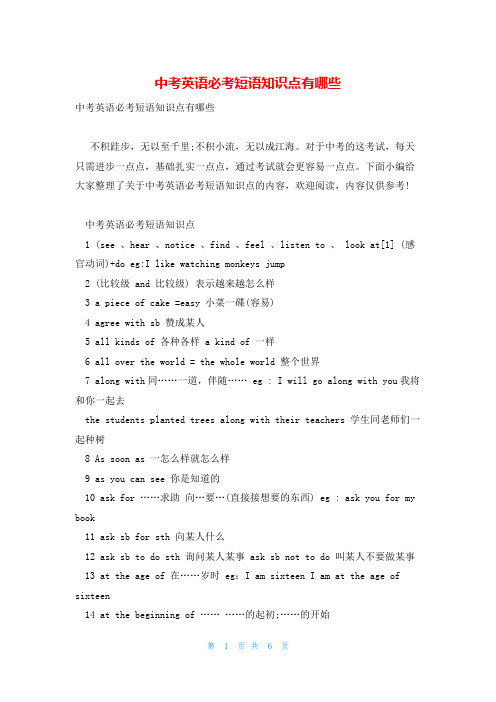
中考英语必考短语知识点有哪些中考英语必考短语知识点有哪些不积跬步,无以至千里;不积小流,无以成江海。
对于中考的这考试,每天只需进步一点点,基础扎实一点点,通过考试就会更容易一点点。
下面小编给大家整理了关于中考英语必考短语知识点的内容,欢迎阅读,内容仅供参考!中考英语必考短语知识点1 (see 、hear 、notice 、find 、feel 、listen to 、 look at[1] (感官动词)+do eg:I like watching monkeys jump2 (比较级 and 比较级) 表示越来越怎么样3 a piece of cake =easy 小菜一碟(容易)4 agree with sb 赞成某人5 all kinds of 各种各样 a kind of 一样6 all over the world = the whole world 整个世界7 along with同……一道,伴随…… eg : I will go along with you我将和你一起去the students planted trees along with their teachers 学生同老师们一起种树8 As soon as 一怎么样就怎么样9 as you can see 你是知道的10 ask for ……求助向…要…(直接接想要的东西) eg : ask you for my book11 ask sb for sth 向某人什么12 ask sb to do sth 询问某人某事 ask sb not to do 叫某人不要做某事13 at the age of 在……岁时 eg:I am sixteen I am at the age of sixteen14 at the beginning of …… ……的起初;……的开始15 at the end of +地点/+时间最后;尽头;末尾 eg : At the end of the day16 at this time of year 在每年的这个时候17 be /feel confident of sth /that clause +从句感觉/对什么有信心,自信eg : I am / feel confident of my spoken English I feel that I can pass the test18 be + doing 表:1 现在进行时 2 将来时19 be able to (+ v 原) = can (+ v 原) 能够…… eg : She is able to sing She can sing20 be able to do sth 能够干什么 eg :she is able to sing21 be afraid to do (of sth 恐惧,害怕…… eg : I m afraed to go out at night I m afraid of dog22 be allowed to do 被允许做什么eg: I m allowed to watch TV 我被允许看电视 I should be allowed to watch TV 我应该被允许看电视23 be angry with sb 生某人的气 eg : Don t be angry with me24 be angry with(at) sb for doing sth 为什么而生某人的气25 be as…原级…as 和什么一样 eg : She is as tall as me 她和我一样高26 be ashamed to27 be away from 远离28 be away from 从……离开29 be bad for 对什么有害 eg : Reading books in the sun is bad for your eyes 在太阳下看书对你的眼睛不好30 be born 出生于31 be busy doing sth 忙于做什么事 be busy with sth 忙于……32 be careful 当心;小心33 be different from…… 和什么不一样34 be famous for 以……35 be friendly to sb 对某人友好36 be from = come from 来自 eg :He is from Bejing He comes from Bejing Is he from Bejing Does he come from Bejing37 be full of 装满……的 be filled with 充满 eg: the glass is full of water the glass is filled with water38 be glad+to+do/从句39 be going to + v(原) 将来时40 be good at(+doing) = do well in 在某方面善长, 善于……41 be good for 对什么有好处 eg : Reading aloud is good for your English42 be happy to do 很高兴做某事43 be helpful to sb 对某人有好处eg : Reading aloud is helpful to you 大声朗读对你有好处Exercising is helpful to your bady 锻炼对你的身体有好处44 be in good health 身体健康45 be in trouble 处于困难中 eg : She is in trouble They are in tronble46 be interested in 对某方面感兴趣47 be late for = come late to 迟到 eg: Be late for class 上课迟到48 be like 像…… eg : I m like my mother49 be mad at 生某人的气50 be made from 由……制成(制成以后看不见原材料)51 be made of 由……制成(制成以后还看得见原材料)52 be not sure 表不确定53 be on a visit to 参观54 be popular with sb 受某人欢迎55 be quiet 安静56 be short for 表____的缩写 eg: 陶 is short for 陶俊杰57 be sick in bed 生病在床58 be sorry to do sth be sorry for sb eg : I am sorry for you59 be sorry to hear that60 be sorry to trouble sb eg : I am sorry to trouble you61 be strict in doing sth 严于做某事 eg : He s strict in obeying noles62 be strict with sb 对某人要求严格 eg: Some students are notstrict with them selves 这些学生对自己不严格63 be strict with sb in sth 某方面对某人严格64 be supposed to do 被要求干什么65 be sure 表确定初中英语答题技巧有哪些把听力关键词记下来考生拿到试卷,贴好条形码、写完考号、姓名之后,应抓紧一切时间先看听力题。
八年级英语常考知识点生词

八年级英语常考知识点生词随着中国与世界的联系日益紧密,英语作为国际通行语言,越来越受到广大人民的关注和重视,尤其是在学生群体中,英语教育更是备受重视。
如何掌握英语知识点,是每个学生必须要面对的问题。
本文主要介绍八年级英语常考知识点中的生词。
一、基础词汇1. catch:抓住,捕捉,赶上2. believe:相信3. difficult:困难的4. different:不同的5. anyway:无论如何6. trouble:麻烦,困境7. accident:意外,事故8. advice:建议,忠告9. against:反对,违背10. among:在……之中二、动词短语1. look for:寻找2. give up:放弃3. pick up:捡起4. take care of:照顾5. set off:出发6. turn off:关掉7. turn on:打开8. put on:穿上9. look after:照顾,照料10. look up:查阅三、形容词与副词1. quiet:安静的2. alone:单独的,孤独的3. friendly:友好的4. sometimes:有时5. somewhere:某处6. always:总是7. carefully:小心地,仔细地8. loudly:大声地9. quickly:迅速地10. easily:容易地四、常用词组1. ask for help:请求帮助2. get to know:了解3. get along with:相处4. make friends:交朋友5. take part in:参加6. feel like:感觉像7. think about:考虑8. be interested in:对……感兴趣9. in a hurry:匆忙地10. as soon as possible:尽快五、生活实用短语1. have a try:尝试一下2. have fun:玩得愉快3. have a good time:度过美好时光4. do well:做的好5. do one’s best:尽力而为6. get ready:准备好7. go ahead:前进8. keep on:继续9. make a decision:做出决定10. wait for:等待六、交际用语1. Thank you.:谢谢你。
[译林版]四上英语 Unit1-4 知识点梳理
![[译林版]四上英语 Unit1-4 知识点梳理](https://img.taocdn.com/s3/m/390ef2634a35eefdc8d376eeaeaad1f347931174.png)
Unit 1 I like dogs(知识点)一、单词:四会:1.like 喜欢 2. dog 狗 3. cat 猫 4. panda 熊猫 5. horse 马6. tiger 老虎三会: 1.animal动物 2.cute可爱的 3.fat胖的 4.elephant大象5.lion狮子6.monkey猴子7.have有8.duck鸭子9.cow奶牛 10.chicken小鸡 11. sheep绵羊 12. bear熊13.rabbit兔子 14.bird鸟 15. fish鱼 16.zebra斑马二、短语四会:1. look at... 看 2.an orange tiger 一只桔色的老虎3.these pandas这些熊猫4.those horses 那些马5. this dog 这只狗6.like that panda喜欢那只熊猫7.like lions 喜欢狮子8.twelve cats 12只猫三会: 1.these toy animals这些玩具动物 2.fat and cute 又胖又可爱3.a little lion一只小狮子4.a fat elephant 一头胖大象5. would like想要6.on the log在木头上7.in the tree/on the tree在树上 8.run with me跟着我跑9.on the mat在毯子上 10.go and get my big bag去拿我的大包三、句子1. I like horses.我喜欢马。
2. I don’t like cats. 我不喜欢猫。
3.I like this tiger.我喜欢这只老虎。
4. I like those dogs.我喜欢那些狗。
5. Do you like pandas? Yes,I do./No, I don't.你喜欢熊猫吗?是的,我喜欢。
/不,我不喜欢.四、知识点1.like后面一般加可数名词复数,表示喜欢某一类东西,如:like dogs/cats/apples如果表示喜欢某一个东西,可以用this/that+单数,如:like this dog/ like that cat如果表示喜欢某一些东西,可以用these/those+复数。
人教版七年级上册英语各单元重点单词 词组 语法知识点总结-听写版

人教新目标英语七年级上册各单元重点单词词组语法知识点总结Starter Units 1 — 3一、重点短语1.早上/下午/晚上好2.晚安3.谢谢你4.用英语5.用汉语5.一个橙子6.一件夹克7.一个不明飞行物8.一把尺子9.一张地图10.一床被子11.一个杯子12.一支红色的钢笔13.一把钥匙14.一床紫色的被子15.一把棕色的钥匙16.一件绿色的夹克17.一张蓝色的画18.一把黄色的尺子19.一台黑白电视20.在早晨21.在下午22.在晚上23.在午夜二、重点句型1.你好吗?我很好,谢谢。
2.你呢?我很好3. Mike好吗?他很好。
4.- 这个用英语怎么说?- 一个橙子。
5.请拼写它。
6.它是什么颜色的?—红色的。
7.这个钥匙是黄色的8.我能说A、B、C 等字母了。
Unit 1 My name’s Gina.一、重点短语1.我的名字2.你的名字3.她的名字.4.他的名字5.他们的名字6.名字7.姓氏8.布朗女士布朗先生布朗夫人9.我的学生卡10.电话号码11.一张身份证12.我的朋友13.很高兴见到你.我也很高兴见到你14.中学15.在六中16.在中国17.0-10:二、重点句型1.— 你叫什么名字?一 . 我叫艾伦。
2.— 她叫什名字?-- 她叫玛丽3.他叫什名字?-- 他叫埃里克4.我朋友在中国。
5.— 你姓什么?—- 我姓格林。
6.—你的电话号码是多少?一我的电话号码是281-9176 8. — 你是海伦吗?—是的,我是。
11.— 他是杰克吗?—是的,他是。
不,他不是。
12.我的妈妈在中国Unit 2 This is my sister.—、重点短语1.一位叔叔2.一位阿姨3.我的祖父母4.他的父母5.我的家6.你的兄弟7.这两个女孩8.在第一张图片里9.在下一张图片里10.过得愉快谢谢,你也是11.我的全家福12.我家的一张照片13.我的狗的名字14.一张中国地图15.在我家16.两张照片二、重点句型1.这是我的朋友简。
初一英语语法及主要知识点归纳总结

初一英语知识点归纳总结分类:英语学习Unit 1 Where’s your pen pal from一.短语:1 .be from = come from 来自于----2.live in 居住在---3.on weekends 在周末4 .write to sb = write a letter to sb 给某人写信;写信给某人5 .in the world 在世界上in China 在中国6.pen pal 笔友14 years old 14岁favorite subject 最喜欢的科目7.the United States 美国the United Kingdom 英国New York 纽约8.speak English 讲英语like and dislike 爱憎9.go to the movies 去看电影play sports 做运动二.重点句式:1 Where’s your pen pal from = Where does your pen pal from/2 Where does he live3 What languages does he speak4 I want a pen pal in China.5 I can speak English and a little French.6 Please write and tell me about yourself.7 Can you write to me soon8 I like going to the movies with my friends and playing sports.三.本单元的国家,人民、语言对应;1 Canada---- Canadian---- English / French2 France------ French------French3 Japan------Japanese----Japanese4 Australia----Australian----- English5 the United States------ American---- English6 the United Kingdom---British----- EnghishU nit 2 Where’s the post office一.Asking ways: 问路1.Where is the nearest …… 最近的……在哪里2.Can you tell me the way to …… 你能告诉我去……的路吗3.How can I get to …… 我怎样到达……呢4.Is there …… near here / in the neighborhood 附近有……吗5.Which is the way to ……哪条是去……的路二.Showing the ways: 指路1. Go straight down / along this street. 沿着这条街一直走;2. Turn left at the second turning. 在第二个路口向左转;3. You will find it on your right. 你会在你右手边发现它;4. It is about one hundred metres from here. 离这里大约一百米远;5. You’d bette r take a bus. 你最好坐公交车去;You’d better+动词原形三.词组1. across from …… 在……的对面across from the bank 在银行的对面2. next to…… 紧靠…… next to the supermarket 紧靠超市3. between……and…… 在……和……之间between the park and the zoo 在公园和动物园之间among 表示位于三者或三者以上之间4. in front of…… 在……前面There is a tree in front of the classroom.课室前面有棵树;in the front of…… 在……内的前部There is a desk in the front of the classroom.课室内的前部有张桌子;5. behind…… 在……后面behind my house 在我家后面6. turn left/ right 向左/右拐on the left/right of…… 在某物的左/右边on the left of our school 在我们学校的左边on one’s left/right 在某人的左/右边on my left 在我左边7. go straight 一直走8. down /along…… 沿着……街道down/along Center Street 沿着中央街9. in the neighborhood=near here 在附近10 welcome to…… 欢迎来到……11. take /have a walk 散步12. the beginning o f…… ……的开始,前端at the beginning of…… 在……的开始,前端in the beginning 起初,一开始13. have fun=have a good time=enjoy oneself 玩得开心,过得愉快我昨天玩得很开心; I had fun yesterday.I had a good time yesterday.I enjoyed myself yesterday.14. have a good trip 旅途愉快15. take a taxi 坐出租车16. 到达:get to +地方get here/ there/ home 到这/那/家arrive in +大地方I arrive in Beijing.arrive at +小地方I arrive at the bank.reach +地方17.go across 从物体表面横过go across the street 横过马路go through 从空间穿过go through the forest 穿过树林18.on + 街道的名称; Eg: on Center Streetat + 具体门牌号+街道的名称Eg: at 6 Center Street三.重难点解析1.enjoy doing sth 享受做某事的乐趣,喜爱做某事I enjoy reading. 我喜爱读书;到目前为止,我们学了两个特殊的动词finish和enjoy,都是要带doing.I finish cleaning the room. 我扫完了这间屋子;2.hope to do sth 希望做某事I hope to pass this exam. 我希望通过这次考试; hope +从句I hope tomorrow will be fine. 我希望明天将会晴朗;从句即是一个小句子,这个小句子又放在大句子中,从属于大句子,所以叫从句;如tomorrow will be fine是一个从句,它又放在I hope 的后面,形成句中有句;3. if 引导一个表示假设的句子;If I have much money, I will go to the moon. 如果我有许多钱,我就会去月球;If you are hungry, you can buy some food in the supermarket.如果你饿了的话,你可以在超市买一些食物;四.本单元的反义词、近义词配对1new—old 2 quiet--- busy 3 dirty--- clean 4 big---- smallUnit 3 Why do you like koala bears一.重点词组eat grass eat leaves be quiet very shy very smart very cuteplay with her friends kind of South Africa other animalsat night in the day every day during the day二. 交际用语1. Why do you like pandas Because they’re very clever.2. Why does he like koalas Because they’re kind of interesting.3. Where are lions from They are from South Africa.4. What other animals do you likeI like dogs, too.WhyBecause they’re friendly and clever.5. Molly likes to play with her friends and eat grass.6. She’s very shy.7. He is from Australia.8.He sleeps during the day, but at night he gets up and eats leaves.9.He usually sleeps and relaxes 20 hours every day.10.Let’s see the pandas first.11.They’re kind of interesting.12.What other animals do you like13.Why do you want to see the lions三. 重点难点释义1、kind of 有点,稍微Koala bears are kind of shy. 考拉有点害羞;kind 还有“种类”的意思如:各种各样的all kinds ofWe have all kinds of beautiful flowers in our school.2、China n. 中国Africa n. 非洲China 和Africa都是专有名词,首字母都应该大写,而且和介词in连用;There are many kinds of tigers in China.There are many kinds of scary animals in Africa.3、friendly adj. 友好的,和蔼可亲的它是名词friend的形容词形式,常常和be动词连用, be friendly;The people in Chengdu are very friendly.4、with prep. 跟,同,和…在一起I usually play chess with my father.注意区别与and的用法,and通常用于连接主语或宾语,连接主语时,如果有I, I通常放在and 之后,如:My father and I usually play chess together.Play with “和…一起玩耍”“玩…”I often play with my pet dog.Don’t play with water5、day和night 是一对反义词,day 表示白天或一天,night表示夜或夜晚;通常说in the day, during the day, at night;Koala bears often sleep during the day and eat leaves at night.6、leaf n. 叶子复数形式为:leaves, 类似的变化还有:wife—wives, wolf—wolves, knife—knives等;7、hour n. 小时;点钟hour前边通常加上冠词an 表示“一个小时”, 即:an hour;There are 24 hours in a day and 60minutes in an hour.8、be from 来自…be from = come fromPandas are from China. = Pandas come form China.9、meat n. 食用的肉,为不可数名词,表示“许多”时,使用much来修饰,即:much meatHe eats much meat every day.10、grass n. 草,为不可数名词,表示“许多”时,使用much来修饰,即:much grass; There is much grass on the playground.四. 语法知识特殊疑问句通常以“what”、“who”、“which”、“when”、“where”、“how”、“how old”、“how many”等开头,对某一具体问题进行提问;特殊疑问句的基本构成有两种情况:1. 疑问句+一般疑问句结构;这是最常见的情况;例如:What’s your grandfather’s telephone number 你爷爷的号码是多少Who is that boy with big eyes 那个大眼睛的男孩是谁Which season do you like best 你最喜欢哪个季节When is he going to play the piano 他什么时候弹钢琴Where does he live 他住在哪儿How are you 你好吗How old are you 你多大了How many brothers and sisters do you have 你有几个兄弟姐妹2. 疑问句+陈述句结构;这时疑问词作主语或修饰主语;例如:Who is on duty today今天谁值日Which man is your teacher哪位男士是你的老师我们学过的What/How about+名词/代词+其他也是特殊疑问句,它是一种省略结构;例如:I like English. What/How about you 我喜欢英语;你呢What about playing basketball 打篮球怎么样Unit 4 I want to be an actor.一.短语:1 want to do sth 想要作某事2 give sb sth = give sth to sb 给某人某物/ 把某物给某人3 help sb do sth 帮助某人作某事Eg: I want to help my mother do some housework at home.4 help sb with sth 帮助某人谋事Eg: I want to help my mother with some housework at home5 in the day 在白天6 at night 在晚上7 talk with/ to sb 和----谈话8 be busy doing sth 忙于做某事Eg: He is busy listening to the teacher.9 in a hospital 在医院l10 work/ study hard 努力工作11 Evening Newspaper 晚报二.重点句式及注意事项:1 询问职业的特殊疑问词是what;有三种主要句式①What + is / are + sb②What + does/ do + sb + do③What + is/ are + 名词所有格/ 形容词性物主代词+ job2 People give me their money or get their money from me.3 Sometimes I work in the day and sometimes at night.4 I like talking to people.5 I work late. I’m very busy when people go out to dinners.6 Where does your sister work7 then we have a job for you as a waiter.8 Do you want to work for a magazine Then come and work for us as a reporter.9 Do you like to work evenings and weekends10 We are an international school for children of 5-12.三.本单元中的名词复数;1 policeman--- policemen2 woman doctor----- women doctors 3thief-----thieves首先主谓宾结构I have an apple.其次定状补I really have a big apple.really做have的状语状语修饰动词动词一般就是谓语动词big做apple的定语定语修饰名词名词一般是主语或宾语最后主系表结构它与主谓宾很相似只不过谓语动词时系动词最常见的是be动词及其变形I am a student;主语通常用于句子开端,主要有:i,you,he,she,it,we,they,但it有时用作形式主语,表特指;谓语,通常放在主语之后,一般是动词,表示“某某人在;;;”宾语,通常放在谓语之后,一般是主语的宾格;有时候是人,有时候是物;定语,状语,通常是从句;定语从句:常有关系代词that\which\who\whoes,关系副词when\where\why.通常选择关系词的步骤是:1、确定先行词2.确定关系词.主系表:主,就是主语;系,特指系动词,就是说当句子中没有谓语时,用系动词来代替;表,修饰系动词用;1、名词A、名词的数我们知道名词可以分为可数名词和不可数名词,而不可数名词它没有复数形式,但可数名词却有单数和复数之分,复数的构成如下:一在后面加s;如:fathers, books, Americans, Germans, apples, bananas二x, sh, ch, s, tch后加es;如:boxes, glasses, dresses, watches, wishes, faxes三1以辅音字母加y结尾的变y为i再加es 如:baby-babies, family-families, duty-duties, comedy-comedies, documentary-documentaries, story-stories2以元音字母加y结尾的直接加s;如:day-days, boy-boys, toy-toys, key-keys, ways四以o结尾加s外来词;如:radios, photos, 但如是辅音加o的加es:如: tomatoes 西红柿, potatoes马铃薯五以f或fe结尾的变f为v再加ess;如:knife-knives, wife-wives, half-halves, shelf-shelves, leaf-leaves, yourself-yourselves六单复数相同不变的有:fish, sheep, deer鹿子, Chinese, Japanese七一般只有复数,没有单数的有:people,pants, shorts, shoes, glasses, gloves, clothes, socks八单词形式不变,既可以是单数也可以是复数的有:police警察局,警察, class班,同学, family家,家庭成员九合成的复数一般只加主要名词,多数为后一个单词;如:action movie-action movies, pen pal-pen pals; 但如果是由man或woman所组成的合成词的复数则同时为复数;如:man doctor-men doctors, woman teacher-women teachers十有的单复数意思不同;如:fish鱼fishes鱼的种类, paper纸papers报纸,卷子,论文, work工作works作品,工厂, glass玻璃glasses玻璃杯,眼镜, orange桔子水oranges橙子, light光线lights灯, people人peoples民族, time时间times 时代, 次数, chicken 鸡肉chickens 小鸡十一单个字母的复数可以有两种形式直接加s或’s;如:Is I’s, Ks K’s;但如是缩略词则只加s;如:IDs, VCDs, SARs十二特殊形式的有:child-children, man-men, woman-women, foot-feet, mouse-mice, policeman-policemen, Englishman-EnglishmenB名词的格当我们要表示某人的什么东西或人时,我们就要使用所有格形式;构成如下:一单数在后面加’s;如:brother’s, Mike’s, teacher’s二复数以s结尾的直接在s后加’,如果不是以s结尾的与单数一样处理;如:Teachers’ Day教师节, classmates’; Children’s Day六一节, Women’s Day三八节三由and并列的名词所有时,如果是共同所有同一人或物时,只加最后一个’s,但分别拥有时却分别按单数形式处理;如:Mike and Ben’s room迈克和本的房间共住一间,Mike’s and Ben’s rooms迈克和本的房间各自的房间2、代词项目人称代词物主代词指示代词反身代词人称主格宾格形容词名词性第一人称单数I me my mine myself复数we us our ours ourselves第二人称单数you you your yours yourself复数you you your yours yourselves第三人称单数she her her hers herselfhe him his his himselfit it its its this that itself复数they them their theirs these those themselves3、动词A 第三人称单数当动词是第三人称单数时,动词应该像名词的单数变动词那样加s,如下:一一般在词后加s;如:comes, spells, waits, talks, sees, dances, trains二在x, sh, ch, s, tch后加es;如:watches, washes, wishes, finishes三1以辅音字母加y结尾的变y为i再加es;如:study-studies, hurry-hurries, try-tries2以元音字母加y结尾的直接加s;如:plays, says, stays, enjoys, buys四以o结尾加es;如:does, goes五特殊的有:are-is, have-hasB 现在分词当我们说某人正在做什么事时,动词要使用分词形式,不能用原形,构成如下:一一般在后加ing;如:spell-spelling, sing-singing, see-seeing, train-training, play-playing, hurry-hurrying, watch-watching, go-going, do-doing二以不发音e的结尾的去掉e再加ing;如:dance-dancing, wake-waking,take-taking, practice-practicing, write-writing, have-having三以重读闭音节结尾且一个元音字母+一个辅音字母注意除开字母组合如show –showing, draw-drawing要双写最后的辅音字母再加ing;如:put-putting,run-running, get-getting, let-letting, begin-beginning四以ie结尾的变ie为y再加ing;如:tie-tying系die-dying死lie-lying 位于4、形容词的级我们在对两个或以上的人或物进行对比时,则要使用比较或最高级形式;构成如下:一一般在词后加er或est如果是以e结尾则直接加r或st;如:greater-greatest, shorter –shortest, taller –tallest, longer –longest, nicer- nicest, larger -largest二以重读闭音节结尾且1个元音字母+1个辅音字母字母组合除外,如few-fewer fewest结尾的双写结尾的辅音再加er /est;如:big-bigger biggest, red-redder reddest, hot-hotter hottest三以辅音字母+y结尾的变y为i加er/est;如:happy-happier happiest,sorry-sorrier sorriest, friendly-friendlier friendliestmore friendly most friendly, busy-busier busiest, easy-easier easiest四特殊情况:两好多坏,一少老远good/well - better best many/much - more most bad/ill – worse worstlittle- less least old- older/elder oldest/eldest far- farther/further farthest/furthest 5、数词基变序,有规则;一、二、三,自己背;五、八、九、十二;其它后接th;y结尾,变为i, eth跟上去; first, second, third; fifth, eighth, ninth, twelfth; seventh, tenth, thirteenth, hundredth; twenty-twentieth, forty-fortieth, ninety-ninetieth二、初一英语语法——句式1.陈述句肯定陈述句a This is a book. be动词b He looks very young. 连系动词c I want a sweat like this. 实义动词d I can bring some things to school. 情态动词e There’s a computer on my desk. There be结构否定陈述句a These aren’t their books. b They don’t look nice.c Kate doesn’t go to No. 4 Middle School.d Kate can’t find her doll.e There isn’t a cat here. =There’s no cat here.2. 祈使句肯定祈使句a Please go and ask the man. b Let’s learn Englishc Come in, please.否定祈使句a Don’t be late. b Don’t hu rry.3. 疑问句1 一般疑问句a Is Jim a student b Can I help you c Does she like saladd Do they watch TVe Is she reading肯定回答: a Yes, he is. b Yes, you can. c Yes, she does. d Yes, they do. e Yes, she is.否定回答: a No, he isn’t. b No, you can’t. c No, she doesn’t. d No, they don’t. e No, she isn’t.2 选择疑问句Is the table big or small 回答It’s big./ It’s small.3 特殊疑问句①问年龄How old is Lucy She is twelve.②问种类What kind of movies do you like I like action movies and comedies.③问身体状况How is your uncle He is well/fine.④问方式How do/can you spell it L-double O-K.How do we contact you My e-mail address is cindyjones163.⑤问原因Why do you want to join the club⑥问时间What’s the time =What time is it It’s a quarter to ten a.m..What time do you us ually get up, Rick At five o’clock.When do you want to go Let’s go at 7:00.⑦问地方Where’s my backpack It’s under the table.⑧问颜色What color are they They are light blue.What’s your favourite color It’s black.⑨问人物Who’s that It’s my sister.Who is the boy in blue My brother.Who isn’t at school Peter and Emma.Who are Lisa and Tim talking to⑩问东西What’s this/that in English It’s a pencil case.What else can you see in the picture I can see some broccoli, strawberries and hamburgers.11问姓名What’s your aunt’s name Her name is Helen./She’s Helen. What’s your first name My first name’s Ben.What’s your family name My family name’s Smith.12 问哪一个Which do you like I like one in the box.13 问字母What letter is it It’s big D/small f.14 问价格How much are these pants They’re 15 dollars.15 问号码What’s your phone number It’s 576-8349.16 问谓语动作What’s he doing He’s watching TV.17 问职业身份 What do you do What’s your father He’s a doctor.句子结构1.S主+ Vi不及物动词谓Time flies.1 S + V + adverbial状语Birds sing beautifully.2 S + Vi+ prep Phrase介词短语He went on holiday.3 S + Vi+ Infinitive 不定式We stopped to have a rest.4 S + Vi+ Participle 分词I'll go swimming.2. S 主+ Vt 及物动词谓+ O宾We like English.1 S + VT + N/PronI like music.I like her.2 S + VT + infinitive不定式I want to help him.常用于这句型的动词有:attempt, dare, decide, desire, expect, hope, intend, learn, need, offer, pretend, promise, propose, purpose, refuse, want, wish等;3 S + VT + Wh-Word + InfinitiveI don't know what to do.常用于这句型的动词有:ask, consider, decide, discover, explain, find out, forget, guess, inquire, know, learn, observe, remember, see, settle, tell, think, understand, wonder等;4 S + VT + GerundI enjoy living here.常用于这句型的动词有:admit, advise, avoid, consider, defend, enjoy, excuse, finish, forbid, mind, miss, practise, risk, suggest, give up, can't help等;5 S + VT + That-clauseI don't think that he is right.常用于这句型的动词有:Admit, believe, command, confess, declare, demand, deny, doubt, expect, explain, feel觉得, hear听说, hope, imagine, intend, know, mean, mind当心, notice, propose, request, report, say, see看出,show, suggest, suppose, think, understand, wish, wonder觉得奇怪;3. S 主+ V谓lv 系动词+ P表We are Chinese.除了be 系动词外,还有一些动词也可以用作系动词,1表感官的动词,feel, smell, taste, sound, look, appear, seem 等;2 表转变变化的动词,become, get, grow, turn, go,等; 3表延续的动词remain, keep, seem, hold, stay, rest等;4表瞬时的动词come, fall, set, cut, occur等5其他动词eat, lie, prove, ring, run, shine, sit, stand, continue, hang等;1 S + Lv + N/Pron名词/代词He is a boy.This is mine.2 S + Lv + Adj形容词She is beautiful.3 S + Lv + Adv 副词Class is over.4 S + Lv + Prep PhraseHe is in good health.5 S + Lv + Participle分词He is excited.The film is interesting.4. S 主+ VT 谓+ In O间接宾+ D O直接宾I give you help.1 S + VT + N/Pron + NI sent him a book.I bought May a book.2 S + VT + N/Pron + To/for-phraseHe sent a book to me.He bought a coat for me.间接宾语前需要加to 的常用动词有:allow, bring, deny, do带来, give, grant, hand, leave, lend, offer, owe, pass, pay, permit, promise, read, refuse, render, restore, sell, send, show, teach, tell wish, write等;间接宾语前需要加for 的常用动词有:bring, buy, cash, choose, fetch, get, leave, make, order, paint, play演奏,save, sing, spare等;5. S 主+ VT谓+ O宾+ O C宾补I make you clear.1 S + VT + N/Pron + NWe named our baby Tom.常用于这句型的动词有:appoint, call, choose, elect, entitle, find, make, name, nominate命名;2 S + VT + N/Pron + AdjHe painted the wall white.常用于这句型的动词有:beat, boil, cut, drive, find, get, hold, keep, leave, like, make, paint, see, set, turn, want, wash, wipe, wish等;3 S + VT + N/Pron + Prep PhraseShe always keeps everything in good order.4 S + VT + N/Pron + InfinitiveI wish you to stay.I made him work常用于这句型的动词有:a不定式带to的词:advice, allow, ask, beg, cause, choose, command, decide, encourage, expect, force, get, hate, invite, know, leave, like, love, order, permit, persuade, prefer, remain, request, teach, tell, want, warn, wish等;b不定式不带to的词:feel, have, hear, know, let, listen to, look at, make, notice, see, watch等;5 S + VT + N/Pron + Participle 分词I heard my name called.I feel something moving.常用于这句型的动词有:catch, feel, find, get, have, hear, imagine, keep, leave, listen to, look at, notice, observe, perceive, see, set, smell, start, watch等;6 S + VT + N/Pron + Wh-word + InfinitiveHe show me how to do it.常用于这句型的动词有:advise, ask, inform, show, teach, tell等;7 S + VT + N/Pron + That-clauseHe told me that the film was great.常用于这句型的动词有:assure, inform, promise, remind, teach, tell, warm等;8 S + VT + N/Pron + Wh-ClauseHe asked me what he should do.常用于这句型的动词有:Advise, ask, inform, show, teach, tell.三、初一英语语法——时态1、一般现在时表示普遍、经常性的或长期性的动作时使用一般现在时,它有:Be 动词:She’s a worker. Is she a worker She isn’t a worker.情态动词:I can play the piano. Can you play the piano I ca n’t play the piano.行为动词:They want to eat some tomatoes. Do they want to eat any tomatoes They don’t want to eat any tomatoes.Gina has a nice watch. Does Gina have a nice watch Gina doesn’t have a watch.2、现在进行时表示动词在此时正在发生或进行就使用进行时态,结构为sb be v-ing sth + 其它.I’m playing baseball. Are you playing baseball I’m not playing baseball. Nancy is writing a letter. Is Nancy writing a letter Nancy isn’t writing a letter.They’re listening to the pop music. Are they listening the pop music They aren’t list ening to the pop music.一.短语:1 .be from = come from 来自于----2.live in 居住在---3.on weekends 在周末4 .write to sb = write a letter to sb 给某人写信;写信给某人5 .in the world 在世界上in China 在中国6.pen pal 笔友14 years old 14岁favorite subject 最喜欢的科目7.the United States 美国the United Kingdom 英国New York 纽约8.speak English 讲英语like and dislike 爱憎9.go to the movies 去看电影play sports 做运动二.重点句式:1 Where’s your pen pal from = Where does your pen pal from/2 Where does he live3 What languages does he speak4 I want a pen pal in China.5 I can speak English and a little French.6 Please write and tell me about yourself.7 Can you write to me soon8 I like going to the movies with my friends and playing sports.三.本单元的国家,人民、语言对应;1 Canada---- Canadian---- English / French2 France------ French------French3 Japan------Japanese----Japanese4 Australia----Australian----- English5 the United States------ American---- English6 the United Kingdom---British----- EnghishUnit 2 Where’s the post office一.Asking ways: 问路1.Where is the nearest …… 最近的……在哪里2.Can you tell me the way to …… 你能告诉我去……的路吗3.How can I get to …… 我怎样到达……呢4.Is there …… near here / in the neighborhood 附近有……吗5.Which is the way to …… 哪条是去……的路二.Showing the ways: 指路1. Go straight down / along this street. 沿着这条街一直走;2. Turn left at the second turning. 在第二个路口向左转;3. You will find it on your right. 你会在你右手边发现它;4. It is about one hundred metres from here. 离这里大约一百米远;5. You’d better take a bus. 你最好坐公交车去;You’d better+动词原形三.词组1. across from …… 在……的对面across from the bank 在银行的对面2. next to…… 紧靠…… next to the supermarket 紧靠超市3. between……and…… 在……和……之间between the park and the zoo 在公园和动物园之间among 表示位于三者或三者以上之间4. in front of…… 在……前面There is a tree in front of the classroom.课室前面有棵树;in the front of…… 在……内的前部There is a desk in the front of the classroom.课室内的前部有张桌子;5. behind…… 在……后面behind my house 在我家后面6. turn left/ right 向左/右拐on the left/right of…… 在某物的左/右边on the left of our school 在我们学校的左边on one’s left/right 在某人的左/右边on my left 在我左边7. go straight 一直走8. down /along…… 沿着……街道down/along Center Street 沿着中央街9. in the neighborhood=near here 在附近10 welcome to…… 欢迎来到……11. take /have a walk 散步12. the beginning of…… ……的开始,前端at the beginning of…… 在……的开始,前端in the beginning 起初,一开始13. have fun=have a good time=enjoy oneself 玩得开心,过得愉快我昨天玩得很开心; I had fun yesterday.I had a good time yesterday.I enjoyed myself yesterday.14. have a good trip 旅途愉快15. take a taxi 坐出租车16. 到达:get to +地方get here/ there/ home 到这/那/家arrive in +大地方I arrive in Beijing.arrive at +小地方I arrive at the bank.reach +地方17.go across 从物体表面横过go across the street 横过马路go through 从空间穿过go through the forest 穿过树林18.on + 街道的名称; Eg: on Center Streetat + 具体门牌号+街道的名称Eg: at 6 Center Street三.重难点解析1.enjoy doing sth 享受做某事的乐趣,喜爱做某事I enjoy reading. 我喜爱读书;到目前为止,我们学了两个特殊的动词finish和enjoy,都是要带doing.I finish cleaning the room. 我扫完了这间屋子;2.hope to do sth 希望做某事I hope to pass this exam. 我希望通过这次考试; hope +从句I hope tomorrow will be fine. 我希望明天将会晴朗;从句即是一个小句子,这个小句子又放在大句子中,从属于大句子,所以叫从句;如tomorrow will be fine是一个从句,它又放在I hope 的后面,形成句中有句;3. if 引导一个表示假设的句子;If I have much money, I will go to the moon. 如果我有许多钱,我就会去月球; If you are hungry, you can buy some food in the supermarket.如果你饿了的话,你可以在超市买一些食物;四.本单元的反义词、近义词配对1new—old 2 quiet--- busy 3 dirty--- clean 4 big---- smallUnit 3 Why do you like koala bears一.重点词组eat grass eat leaves be quiet very shy very smart very cuteplay with her friends kind of South Africa other animalsat night in the day every day during the day二. 交际用语1. Why do you like pan das Because they’re very clever.2. Why does he like koalas Because they’re kind of interesting.3. Where are lions from They are from South Africa.4. What other animals do you likeI like dogs, too.WhyBecause they’re friendly and clever.5. Molly likes to play with her friends and eat grass.6. She’s very shy.7. He is from Australia.8.He sleeps during the day, but at night he gets up and eats leaves. 9.He usually sleeps and relaxes 20 hours every day.10.Let’s see the pandas first.11.They’re kin d of interesting.12.What other animals do you like13.Why do you want to see the lions三. 重点难点释义1、kind of 有点,稍微Koala bears are kind of shy. 考拉有点害羞;kind 还有“种类”的意思如:各种各样的all kinds ofWe have all kinds of beautiful flowers in our school.2、China n. 中国Africa n. 非洲China 和Africa都是专有名词,首字母都应该大写,而且和介词in连用;There are many kinds of tigers in China.There are many kinds of scary animals in Africa.3、friendly adj. 友好的,和蔼可亲的它是名词friend的形容词形式,常常和be动词连用, be friendly;The people in Chengdu are very friendly.4、with prep. 跟,同,和…在一起I usually play chess with my father.注意区别与and的用法,and通常用于连接主语或宾语,连接主语时,如果有I, I通常放在and 之后,如:My father and I usually play chess together.Play with “和…一起玩耍”“玩…”I often play with my pet dog.Don’t play with water5、day和night 是一对反义词,day 表示白天或一天,night表示夜或夜晚;通常说in the day, during the day, at night;Koala bears often sleep during the day and eat leaves at night.6、leaf n. 叶子复数形式为:leaves, 类似的变化还有:wife—wives, wolf—wolves, knife—knives等;7、hour n. 小时;点钟hour前边通常加上冠词an 表示“一个小时”, 即:an hour;There are 24 hours in a day and 60minutes in an hour.8、be from 来自…be from = come fromPandas are from China. = Pandas come form China.9、meat n. 食用的肉,为不可数名词,表示“许多”时,使用much来修饰,即:much meatHe eats much meat every day.10、grass n. 草,为不可数名词,表示“许多”时,使用much来修饰,即:much grass; There is much grass on the playground.四. 语法知识特殊疑问句通常以“what”、“who”、“which”、“when”、“where”、“how”、“how old”、“how many”等开头,对某一具体问题进行提问;特殊疑问句的基本构成有两种情况:1. 疑问句+一般疑问句结构;这是最常见的情况;例如:What’s your grandfather’s telephone number 你爷爷的号码是多少Who is that boy with big eyes 那个大眼睛的男孩是谁Which season do you like best 你最喜欢哪个季节When is he going to play the piano 他什么时候弹钢琴Where does he live 他住在哪儿How are you 你好吗How old are you 你多大了How many brothers and sisters do you have 你有几个兄弟姐妹2. 疑问句+陈述句结构;这时疑问词作主语或修饰主语;例如:Who is on duty today今天谁值日Which man is your teacher哪位男士是你的老师我们学过的What/How about+名词/代词+其他也是特殊疑问句,它是一种省略结构;例如:I like English. What/How about you 我喜欢英语;你呢What about playing basketball 打篮球怎么样Unit 4 I want to be an actor.一.短语:1 want to do sth 想要作某事2 give sb sth = give sth to sb 给某人某物/ 把某物给某人3 help sb do sth 帮助某人作某事Eg: I want to help my mother do some housework at home.4 help sb with sth 帮助某人谋事Eg: I want to help my mother with some housework at home5 in the day 在白天6 at night 在晚上7 talk with/ to sb 和----谈话8 be busy doing sth 忙于做某事Eg: He is busy listening to the teacher.9 in a hospital 在医院l10 work/ study hard 努力工作11 Evening Newspaper 晚报二.重点句式及注意事项:1 询问职业的特殊疑问词是what;有三种主要句式①What + is / are + sb②What + does/ do + sb + do③What + is/ are + 名词所有格/ 形容词性物主代词+ job2 People give me their money or get their money from me.3 Sometimes I work in the day and sometimes at night.4 I like talking to people.5 I work late. I’m very busy when people go out to dinners.6 Where does your sister work7 then we have a job for you as a waiter.8 Do you want to work for a magazine Then come and work for us as a reporter.9 Do you like to work evenings and weekends10 We are an international school for children of 5-12.三.本单元中的名词复数;。
知识点——takeup及相关短语

知识点——takeup及相关短语Take Up及相关短语知识点在英语学习中,我们经常会遇到一些常用的短语和词组,其中包括了“take up”及其相关短语。
本文将详细介绍这些短语的用法及意义。
1. take up的基本意思是“开始从事某种活动或兴趣”。
例如:- I've decided to take up painting as a hobby.(我决定开始追求绘画作为一种兴趣。
)- She took up running last year and has since completed two marathons.(去年她开始跑步,之后已经完成了两次马拉松比赛。
)2. 另外,take up也可以指占用时间、空间或资源。
例如:- The meeting took up the entire morning.(会议占用了整个上午的时间。
)- The couch takes up too much space in the living room.(沙发在客厅占用了太多的空间。
)- The new project will take up most of our budget.(这个新项目将占用我们大部分预算。
)3. 此外,take up还可表示对某事的反应或回应,意思是“对某事作出反应或回答”。
例如:- He refused to take up the offer.(他拒绝接受这个提议。
)- The politician took up the criticism during the press conference.(这位政治家在新闻发布会上回应了批评。
)4. take up还可用来表示“占据或填补(时间、空间或位置)”。
例如:- The new book takes up a significant amount of shelf space.(这本新书占据了很大一部分书架空间。
初中英语知识点大全总结
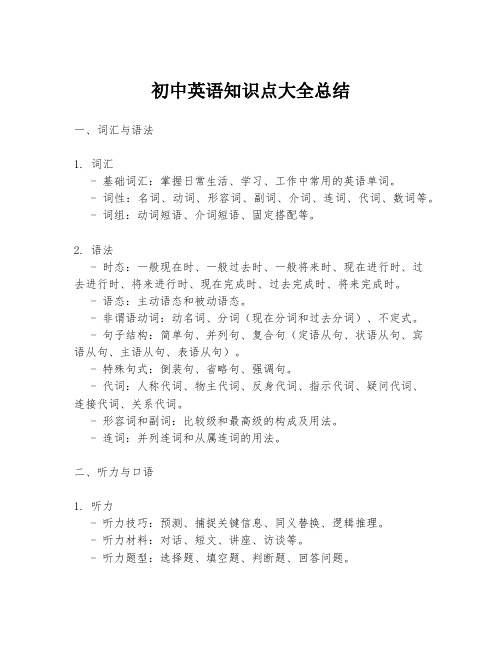
初中英语知识点大全总结一、词汇与语法1. 词汇- 基础词汇:掌握日常生活、学习、工作中常用的英语单词。
- 词性:名词、动词、形容词、副词、介词、连词、代词、数词等。
- 词组:动词短语、介词短语、固定搭配等。
2. 语法- 时态:一般现在时、一般过去时、一般将来时、现在进行时、过去进行时、将来进行时、现在完成时、过去完成时、将来完成时。
- 语态:主动语态和被动语态。
- 非谓语动词:动名词、分词(现在分词和过去分词)、不定式。
- 句子结构:简单句、并列句、复合句(定语从句、状语从句、宾语从句、主语从句、表语从句)。
- 特殊句式:倒装句、省略句、强调句。
- 代词:人称代词、物主代词、反身代词、指示代词、疑问代词、连接代词、关系代词。
- 形容词和副词:比较级和最高级的构成及用法。
- 连词:并列连词和从属连词的用法。
二、听力与口语1. 听力- 听力技巧:预测、捕捉关键信息、同义替换、逻辑推理。
- 听力材料:对话、短文、讲座、访谈等。
- 听力题型:选择题、填空题、判断题、回答问题。
2. 口语- 发音:元音、辅音、连读、失去爆破、语调、重音。
- 口语表达:日常交流、描述事物、表达意见、进行讨论。
- 口语题型:情景对话、图片描述、角色扮演、自由发言。
三、阅读与写作1. 阅读- 阅读技巧:快速阅读、精读、扫读、略读、寻找主旨大意、推断词义。
- 阅读材料:故事、科普文章、新闻报道、广告、说明文等。
- 阅读理解题型:选择题、判断题、填空题、回答问题。
2. 写作- 写作类型:记叙文、议论文、说明文、应用文(书信、日记、通知、报告)。
- 写作技巧:构思、组织结构、运用词汇和句型、连接词的使用、审题和修改。
- 写作格式:段落结构、标点符号、大小写、引用和参考文献。
四、英语文化与学习策略1. 英语文化- 节日习俗:圣诞节、感恩节、万圣节等。
- 历史地理:主要英语国家的历史和文化、地理位置。
- 文学艺术:著名英语作家和作品、音乐、电影等。
牛津英语六年级(全年级)重点知识点,句型,单词,短语整理总结
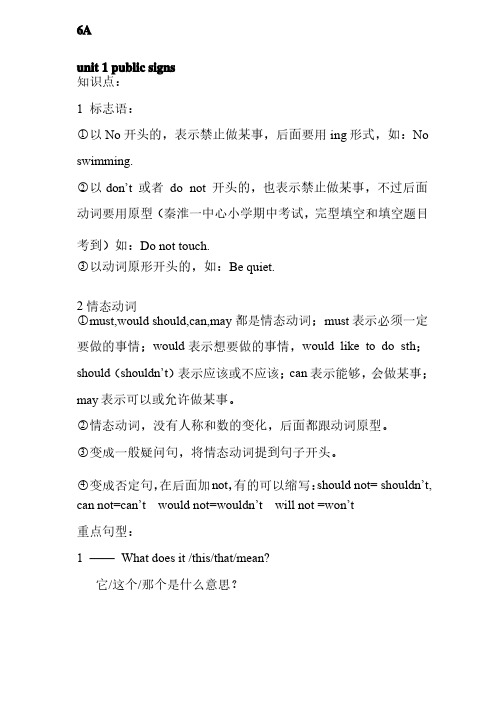
6Aunit 1 public signs知识点:知识点:1 标志语:标志语:○1以No 开头的,表示禁止做某事,后面要用ing 形式,如:No swimming.○2以don don’’t 或者或者do not 开头的,也表示禁止做某事,不过后面动词要用原型(秦淮一中心小学期中考试,完型填空和填空题目考到)如:Do not touch.○3以动词原形开头的,如:Be quiet. 2情态动词情态动词○1must,would should,can,may 都是情态动词;must 表示必须一定要做的事情;would 表示想要做的事情,would like to do sth ;should (shouldn shouldn’’t )表示应该或不应该;can 表示能够,会做某事;may 表示可以或允许做某事。
表示可以或允许做某事。
○2情态动词,没有人称和数的变化,后面都跟动词原型。
情态动词,没有人称和数的变化,后面都跟动词原型。
○3变成一般疑问句,将情态动词提到句子开头。
变成一般疑问句,将情态动词提到句子开头。
○4变成否定句,在后面加not ,有的可以缩写:should not= shouldn should not= shouldn’’t, can not=can can not=can’’t would not=wouldn would not=wouldn’’t will not =won will not =won’’t重点句型:重点句型:1 ————What does it /this/that/mean? 它/这个/那个是什么意思?那个是什么意思?It means you /wemust/should/shoudn It means you /wemust/should/shoudn’’t..意思是你/我们必须/应当/不应该。
解析:解析:当你不知道一个标志、一个词语或者一句话的意思时,可以用这句话来询问。
中考英语必考知识点

中考英语必考知识点一、动词词组(包括短语动词)、介词词组和其他词组(一)1.由be构成的词组be good at 善于,擅长于 be careful of 当心,注意,仔细be covered with 被……复盖 be ready for 为……作好准备be surprised (at) 对……感到惊讶 be interested in 对……感到举be on 在进行,在上演, (灯)亮着be able to do sth. 能够做… be angry with sb. 生(某人)的气be pleased (with) 对……感到高兴(满意)be strict in (with) (对工作、对人)严格要求be from 来自……,什么地方人 be worried 担忧be covered with 被……所覆盖…… be in trouble 处于困境中 be made of (from) 由……制成be satisfied with 对……感到满意 be free 空闲的,有空be (ill) in bed 卧病在床 be glad to do sth. 很高兴做……be late for ……迟到2ee back 回来 e on 快,走吧,跟我来加油 5)e out出来出版e up 上来 e from 来自……3.dodo more speaking/reading 多做口头练习/朗读 doone's best 尽力do some shopping (cooking reading, cleaning)买东西(做饭菜,读点书,大扫除)do morning exercises 做早操do eye exercises 做眼保健操 do well in 在……某方面干得好4.get1)get ready for (=be ready for) 为……作好准备2)get on (well) with 与…相处(好)3)get back 返回 4)get rid of 除掉,去除 5)get in 进入,收集6)get on/off 上/下车 7)get to 到达 8)get there 到达那里5.give1)give sb. a call 给……打电话 2)give a talk 作报告3)give a lecture (a piano concert)作讲座(举行钢琴音乐会)4)give back 归还,送回5)give……some advice on 给……一些忠告6)give lessons to 给……上课 7)give in 屈服 8)give up 放弃9) give sb. a chance 给……一次机会6.go1)go ahead 先走,向前走,去吧,干吧 2)go to the cinema 看电影 3)go to bed 睡觉4)go to school (college) 上学(上大学) 5)go to (the) hospital 去医院看病6)go over 复习/ go over to 朝……走去7)go fishing/skating/swimming/shopping 去钓鱼/滑冰/游泳/买东西8)go home (there) 回家去(去那儿) 9)go round 顺便去,绕道走10)go up 上去 11)go out for a walk 外出散步12)go on (doing) 继续(做……)13)go upstairs/downstairs 上/下楼 14)(the lights) go out (灯)熄了7. havehave a football match (basketball match) 举行一场足球(蓝球)赛have a try 试一试 have a good/wonderful time 玩得很高兴 have a report (talk) on 听一个关于……的报告have breakfast/lunch/supper 吃早饭/午饭/晚饭have a meal (three meals) 吃一顿饭(三餐饭) have (have got) a headache 头痛have a fever 发烧have a cough (a cold) 咳嗽(感冒) have a look (at) 看一看……have a rest (a break) 休息一会儿(工间或课间休息) have a talk 谈话have a swim/walk 游泳/散步 have a sports meet (meeting) 开运动会 have something done 让人(请人)做……have a word with 与……谈几句话8.helphelp sb. with sth. help sb. do sth. 在……方面帮助…… 帮助……做help each other 互相帮助9.keep1)keep up with 跟上……,不落后于……2)keepsilent/quiet 保持沉默/安静3)keep sb. doing sth. 使……一直做……4)keep one's diary 记日记10.make1)make a noise (a lot of noise, much noise, noises)吵闹(十分嘈杂,响声)2)make a living 谋生 3)make sb. do sth. 让某人做……4)make faces (a face)做鬼脸5)make friends (with)与……交朋友 6)make a mistake (mistakes)犯错误7.make room/space for 给…腾出地方 8.make a sentence (sentences)with 用……造句9)make a fire 生火11.look1)look out of (outside) 往外看(看外面) 2)look up a word (in the dictionary) 3)look up 往上看,仰望 4)look after 照管,照看,照顾5)look for 寻找6)look like 看上去像7)look fine/well/tired/worried 看起来气色好/健康/疲劳/忧虑8)look out 当心,小心 10)look around 朝四周看11)look at 看着……12.put1)put on 穿上(衣服),戴上(帽子),上演(戏剧) 2)put up 建造,搭起,挂起,举起,张帖 4)put one's heart into 全神贯注于 put away 把…放好 put off 推迟 put out 灭火5)put…down… 把……放下13.set1)set up 竖起,建起 3)set out 出发3.)set an example for 为……树立榜样14.take1)take one's advice 听从某人劝告2)take out 拿出,取出3)take down 拿下4)take place 发生5)take one's place 坐……的座位,代替某人职务6)take the place of 代替……7)take a walk/rest 散步/休息8)take it easy 别紧张9)take care of 关心/照顾/保管10)take away 拿走 11)take off 脱下(衣,帽,鞋等)拿掉12)take (an active) part in (积极)参加(活动13)take photos 拍照14)take some medicine 服药 15)take a bus/train, boat/ 乘公共汽车,火车/船15.turn1)turn on 开,旋开(电灯,收音机等) 2)turn off 关上(电灯,收音机等)3)turn in 交出,上交 4)turn down (把音量)调低5)turn…over 把……翻过来重点句型1.I think…意为“我认为……”,是对某人或某事的看法或态度的一种句型。
(完整版)高中英语知识点全面总结整理版

高中英语总结目录:一、重点单词二、重点词组三、高级词汇四、词组固定搭配五、高级句型结构六、过去完成时概念七、阅读理解解题指导一、重点单词1.able 用法:be able to doNote: 反义词unable表示不能,而disabled表示残疾的。
be able to do可以表示经过艰难困苦才能做到的事。
2.abroad 用法:表示到(在)国外,是一个副词,前面不加介词。
Note: 可以说from abroad, 表示从国外回来。
3.admit 用法:表示承认的时候后面要加上动名词形式。
Note: 表示允许进入的时候与介词to搭配。
4.advise 用法:advise sb. to do; advise doingNote: 后面的宾语从句要用虚拟语气。
即:advise that sb. (should) do的形式。
5.afford 用法:通常与动词不定式搭配使用。
Note: 前面需要有be able to或can等词。
6.after 用法:表示在时间、空间之后;be after表示追寻。
Note: 用在将来时的时候后面接一时间点,而in接一个时间段,如:after 3 o’clock; in 3 days.7.agree 用法:与介词on, to, with及动词不定式搭配。
Note: agree on表示达成一致;agree to表示批准;agree with表示同意某人说的话。
8.alive 用法:表语性形容词,在句中只能作表语,不能作定语。
Note: 可以作状语使用,表示活活地,如:bury sb. alive.9.allow 用法:allow doing; allow sb. to doNote: 可以表示允许进入,如:Please allow me in.10.among 用法:用在三者或三者以上的群体中。
Note: 还可以表示其中之一,如:He is among the best.11.and 用法:用于连接两个词、短语、句子或其他相同结构。
人教版英语八年级上册第三单元短语语法知识点总结

Unit3I’mmoreoutgoingthanmysister 一、词组、短语:01.moreoutgoing更外向/更开朗,02.as...as...与……一样,03.thesingingcompetition歌咏比赛,04.themostimportant最重要的,05.betalentedinmusic在音乐方面有天赋,06.thesameas与……相同07.careabout关心/留意/关注,08.bedifferentfrom与…不同,09.belikeamirror像一面镜子,10.aslongas与…一样长,11.bringout显示/显出/生产/带来,12.getbettergrade取得好成绩,13.reachfor伸手达到/达到14.touchone’sheart感动,15.infact事实上,16.makefriends交朋友,17.begoodat在某方面成绩好,18.theother另一个,19.besimilarto对…熟悉,20.begoodwith与…和睦相处二、重要句子:01.SamhaslongerhairthanTom.萨姆的头发比汤姆的长。
02.ShealsosingsmoreloudlythanTara.她唱歌也比泰拉声音大。
03.Nellysangsowell.内莉唱得如此好。
04.Forme,agoodfriendlikestodothesamethingsasme.对于我来说,好朋友喜欢跟我做相同的事情。
05.Whoissmarter,yourmotheroryourfather谁更聪明,你妈妈还是你爸爸?06.It’snotnecessarytobethesame.没有必要相同。
07.Ithinkagoodfriendmakesmelaugh.我认为好朋友会让我笑。
08.Mollystudiesharderthanherbestfriend.莫莉比她更好的朋友学习更努力。
四年级英语必背知识点
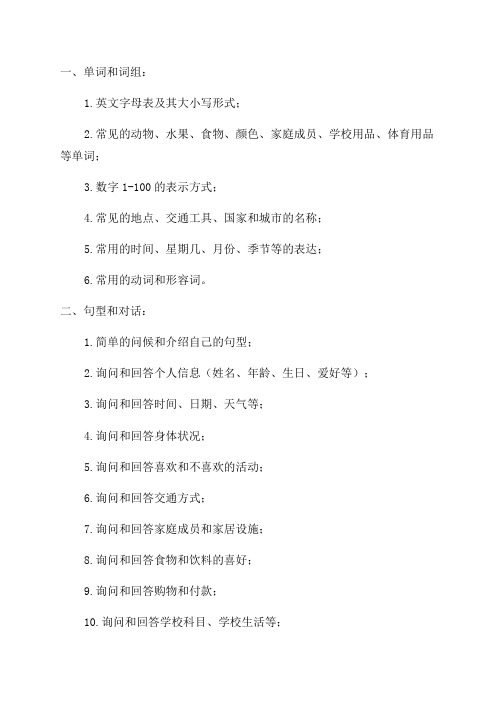
一、单词和词组:1.英文字母表及其大小写形式;2.常见的动物、水果、食物、颜色、家庭成员、学校用品、体育用品等单词;3.数字1-100的表示方式;4.常见的地点、交通工具、国家和城市的名称;5.常用的时间、星期几、月份、季节等的表达;6.常用的动词和形容词。
二、句型和对话:1.简单的问候和介绍自己的句型;2.询问和回答个人信息(姓名、年龄、生日、爱好等);3.询问和回答时间、日期、天气等;4.询问和回答身体状况;5.询问和回答喜欢和不喜欢的活动;6.询问和回答交通方式;7.询问和回答家庭成员和家居设施;8.询问和回答食物和饮料的喜好;9.询问和回答购物和付款;10.询问和回答学校科目、学校生活等;11.询问和回答周末和假期的活动;12.感谢和道歉的表达;13.对话中常用的交际用语。
三、语法:1. 介词的基本用法,如in/on/under/near等;2. 冠词的用法,如a/an/the;3.一般现在时的肯定句、否定句和疑问句;4.一般过去时的肯定句、否定句和疑问句;5. 表示能力和允许的情态动词can和may的用法;6. 表示请求和邀请的情态动词can和would you like的用法;7.形容词的比较级和最高级的构成及用法;8.代词的基本用法和人称代词的主格和宾格形式;9.物主代词的形式和用法;10.数词的基本用法和表示数量的词组;11. 动词的-ing形式和第三人称单数形式;12.简单句和复合句的构成和用法;13.简单句的主谓一致。
四、常用表达:1. 表示喜欢和不喜欢的形容词,如I like/love/hate;2. 表示感受的形容词和副词,如beautiful/happy/sad;3. 表示身体状况和健康的形容词和动词,如tired/healthy/exercise;4. 表示天气和季节的形容词和副词,如sunny/cloudy/warm;5. 表示颜色和形状的形容词,如red/blue/circle;6. 表示购物和支付的动词和短语,如buy/sell/cost;7. 表示学校科目和学校活动的名词和短语,如math/science/experiment;8. 表示动物和动物叫声的名词和动词,如dog/cat/bark/meow;9. 表示食物和饮料的名词和动词,如apple/orange/eat/drink;10. 表示交通工具和行为的名词和动词,如car/bus/walk/ride;11. 表示家庭成员和家居设施的名词和形容词,如mother/father/bed/wall;12. 表示节日和活动的名词和动词,如Christmas/birthday/party/celebrate。
外研社六年级上册的知识点
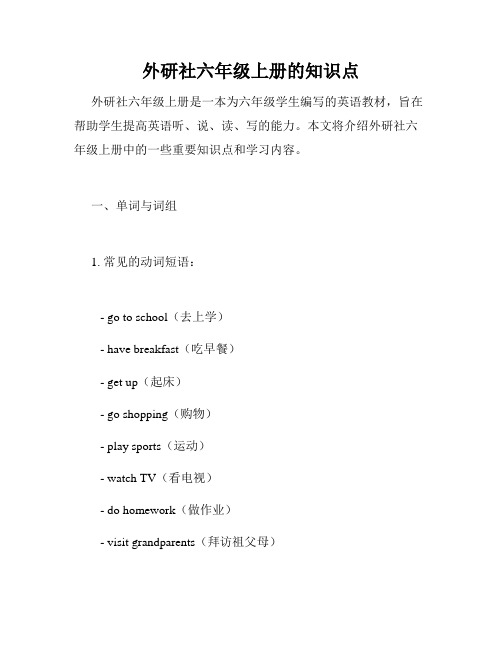
外研社六年级上册的知识点外研社六年级上册是一本为六年级学生编写的英语教材,旨在帮助学生提高英语听、说、读、写的能力。
本文将介绍外研社六年级上册中的一些重要知识点和学习内容。
一、单词与词组1. 常见的动词短语:- go to school(去上学)- have breakfast(吃早餐)- get up(起床)- go shopping(购物)- play sports(运动)- watch TV(看电视)- do homework(做作业)- visit grandparents(拜访祖父母)2. 介词短语:- in the morning(在早上)- on the weekend(在周末)- at school(在学校)- with friends(和朋友一起)- by bus(乘坐公交车)3. 数字与时间短语:- one, two, three(一、二、三)- Sunday, Monday, Tuesday(周日、周一、周二) - January, February, March(一月、二月、三月) - nine o'clock(九点钟)- half past five(五点半)二、语法知识1. 一般现在时:- 主语+动词原形(第三人称单数添加-s)- 例句:I go to school every day.(我每天去上学。
)2. 一般过去时:- 主语+动词过去式- 例句:He visited his grandparents yesterday.(他昨天拜访了他的祖父母。
)3. 现在进行时:- 主语+be动词+动词-ing- 例句:They are playing basketball now.(他们现在正在打篮球。
)4. 句型转换:- 肯定句转否定句:将be动词或助动词not放在句子中- 例句:He is reading a book.(肯定句)→ He is not reading a book.(否定句)三、阅读与写作1. 阅读理解:- 阅读短文,回答问题- 根据短文内容选择正确答案2. 书写规范:- 首字母大写,句末标点符号使用正确- 正确使用大小写和标点符号- 注意句子结构和语法准确性四、听力与口语1. 听力训练:- 听录音选择正确答案- 听短文回答问题2. 口语表达:- 与同学进行简单对话- 用英语描述自己的日常活动五、综合能力训练1. 语音练习:- 根据音标正确发音- 重点练习常见单词和短语的发音2. 写作训练:- 根据给定的话题写短文- 提高写作能力和写作表达的逻辑性通过学习外研社六年级上册的知识点,学生们可以逐渐提高英语的听、说、读、写的能力。
高中英语知识点总结(高考必考)
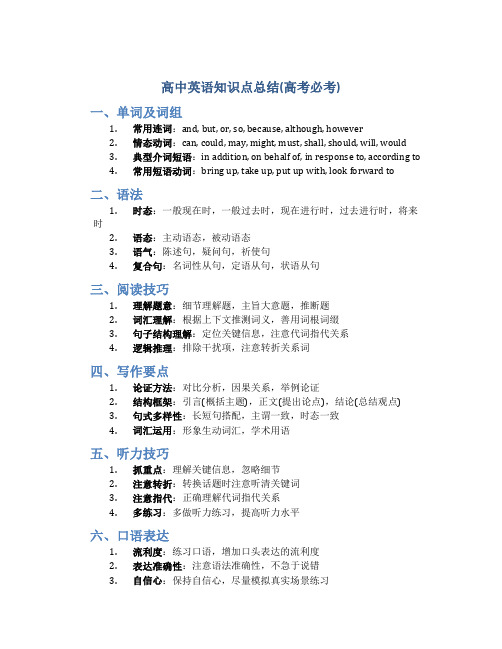
高中英语知识点总结(高考必考)一、单词及词组1.常用连词:and, but, or, so, because, although, however2.情态动词:can, could, may, might, must, shall, should, will, would3.典型介词短语:in addition, on behalf of, in response to, according to4.常用短语动词:bring up, take up, put up with, look forward to二、语法1.时态:一般现在时,一般过去时,现在进行时,过去进行时,将来时2.语态:主动语态,被动语态3.语气:陈述句,疑问句,祈使句4.复合句:名词性从句,定语从句,状语从句三、阅读技巧1.理解题意:细节理解题,主旨大意题,推断题2.词汇理解:根据上下文推测词义,善用词根词缀3.句子结构理解:定位关键信息,注意代词指代关系4.逻辑推理:排除干扰项,注意转折关系词四、写作要点1.论证方法:对比分析,因果关系,举例论证2.结构框架:引言(概括主题),正文(提出论点),结论(总结观点)3.句式多样性:长短句搭配,主谓一致,时态一致4.词汇运用:形象生动词汇,学术用语五、听力技巧1.抓重点:理解关键信息,忽略细节2.注意转折:转换话题时注意听清关键词3.注意指代:正确理解代词指代关系4.多练习:多做听力练习,提高听力水平六、口语表达1.流利度:练习口语,增加口头表达的流利度2.表达准确性:注意语法准确性,不急于说错3.自信心:保持自信心,尽量模拟真实场景练习4.词汇丰富性:扩充词汇量,让表达更加生动有趣以上是关于高中英语知识点总结的内容,希望对您的学习有所帮助。
祝您考试顺利!。
三年级英语上册短语和用法总结
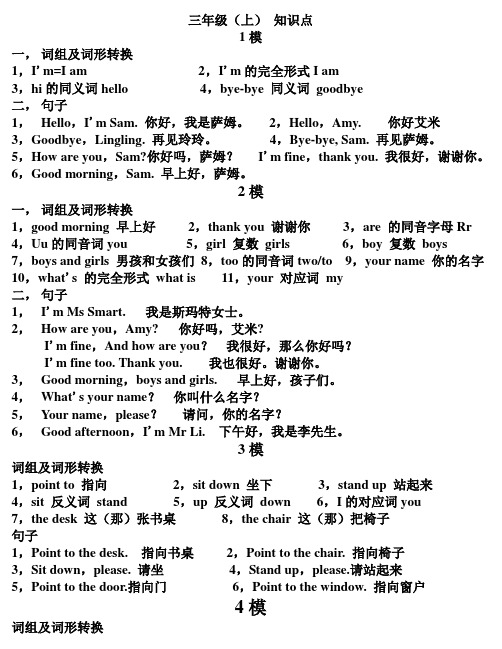
三年级(上)知识点1模一,词组及词形转换1,I'm=I am 2,I'm的完全形式I am3,hi的同义词hello 4,bye-bye 同义词goodbye二,句子1,Hello,I'm Sam. 你好,我是萨姆。
2,Hello,Amy. 你好艾米3,Goodbye,Lingling. 再见玲玲。
4,Bye-bye, Sam. 再见萨姆。
5,How are you,Sam?你好吗,萨姆?I'm fine,thank you. 我很好,谢谢你。
6,Good morning,Sam. 早上好,萨姆。
2模一,词组及词形转换1,good morning 早上好2,thank you 谢谢你3,are 的同音字母Rr 4,Uu的同音词you 5,girl 复数girls 6,boy 复数boys7,boys and girls 男孩和女孩们8,too的同音词two/to 9,your name 你的名字10,what's 的完全形式what is 11,your 对应词my二,句子1,I'm Ms Smart. 我是斯玛特女士。
2,How are you,Amy? 你好吗,艾米?I'm fine,And how are you?我很好,那么你好吗?I'm fine too. Thank you. 我也很好。
谢谢你。
3,Good morning,boys and girls. 早上好,孩子们。
4,What's your name?你叫什么名字?5,Your name,please?请问,你的名字?6,Good afternoon,I'm Mr Li. 下午好,我是李先生。
3模词组及词形转换1,point to 指向2,sit down 坐下3,stand up 站起来4,sit 反义词stand 5,up 反义词down 6,I的对应词you7,the desk 这(那)张书桌8,the chair 这(那)把椅子句子1,Point to the desk. 指向书桌2,Point to the chair. 指向椅子3,Sit down,please. 请坐4,Stand up,please.请站起来5,Point to the door.指向门6,Point to the window. 指向窗户4模词组及词形转换1,a chameleon 一只变色龙2,a panda 一只熊猫3,point to 指向4,it is 缩写it's5,black 的反义词white 6,my name is(同义短语)I am7,I am的缩写I'm 8,a black dog 一只黑色的狗9,a red cat 一只红色的猫10,a blue cat 一只蓝色的猫11,a green cat 一只绿色的猫12,a yellow cap 一顶黄色的帽子13,cap 同义词hat 14,I'm的完全形式I am15,my(我的)对应词your(你的)16,it's完全形式it is句子1,What's your name?你叫什么名字?2,My name is Panpan. 我的名字叫盼盼。
- 1、下载文档前请自行甄别文档内容的完整性,平台不提供额外的编辑、内容补充、找答案等附加服务。
- 2、"仅部分预览"的文档,不可在线预览部分如存在完整性等问题,可反馈申请退款(可完整预览的文档不适用该条件!)。
- 3、如文档侵犯您的权益,请联系客服反馈,我们会尽快为您处理(人工客服工作时间:9:00-18:30)。
2011中考英语知识点:短语、词组
由动词开头构成的短语、词组很多。
复习时应分类处理:
一、动词+介词
1.look at…看…,look like … 看上去像……,
look after …照料…
2.listen to…听……
3.welcome to…欢迎到……
4.say hello to …向……问好
5.speak to…对……说话
此类短语相当于及物动词,其后必须带宾语,但宾语无论是名词还是代词,都要放在介词之后。
如:
This is my new bike. Please look it after.(×)
This is my new bike. Please look after it.(√)
二、动词+副词
“动词+副词”所构成的短语义分为两类:
A.动词(vt.)+副词
1.put on 穿上
2.take off脱下
3.write down记下
此类短语可以带宾语,宾语若是名词,放在副词前后皆可;宾语若是人称代词,只能放在副词的前面。
试比较:
First listen to t he tape, then write down the answer/write the answer down. (√)
First listen to the answer, then write down it.(×)
First listen to the answer, then write it down.(√)
B.动词(vi)+副词。
e on赶快
2.get up起床
3.go home回家
e in进来
5.sit down坐下
6.stand up起立
此类短语属于不及物动词,不可以带宾语。
三、其它类动词词组
1.close the door
2.1ook the same
3.go to work/class
4.be ill
5.have a look/seat
6.have supper
7.1ook young
8.go shopping
9.watch TV/games 10. play games。
